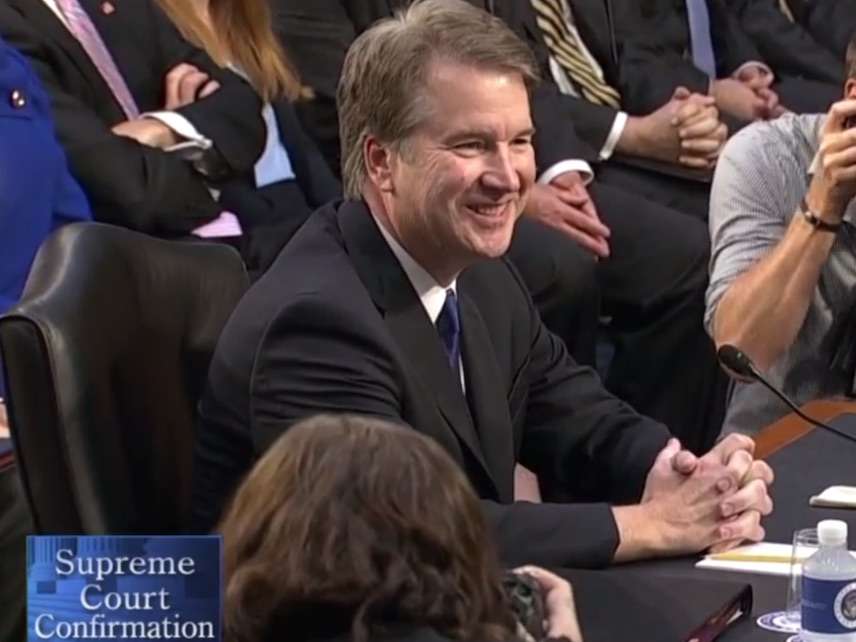Brett Kavanaugh Praises Anthony Kennedy's 'Legacy of Liberty.' Many Conservatives Won't Like the Sound of That.
"Justice Kennedy established a legacy of liberty for ourselves and our posterity."

In his opening statement yesterday before the Senate Judiciary Committee, Supreme Court nominee Brett Kavanaugh took the opportunity to honor the man whose seat on the Court he soon hopes to fill. Justice Anthony Kennedy "is a mentor, a friend, and a hero," Kavanaugh said. "He fiercely defended the independence of the judiciary. And he was a champion of liberty." In fact, Kavanaugh stressed, "if you had to sum up Justice Kennedy's entire career in one word: liberty. Justice Kennedy established a legacy of liberty for ourselves and our posterity."
Many conservatives won't like the sound of that. Liberty, after all, was the watchword in Kennedy's landmark opinions securing the constitutionality of gay rights. The concept of constitutional liberty is simply inseparable from those parts of Kennedy's jurisprudence that many conservatives dislike the most.
Consider Lawrence v. Texas (2003). At issue before the Supreme Court was the constitutionality of that state's prohibition on what it called "homosexual conduct." Writing for the majority, Kennedy struck down the ban because it violated the Due Process Clause of the 14th Amendment, which forbids the states from depriving any person of life, liberty, or property, without due process of law.
"Liberty protects the person from unwanted government intrusions into a dwelling or other private places," Kennedy wrote. "Liberty presumes an autonomy of self that includes freedom of thought, belief, expression, and certain intimate conduct." Because the state's Homosexual Conduct Act trampled on this bedrock guarantee of liberty, Kennedy led the Court in ruling it unconstitutional.
Writing in dissent, Justice Antonin Scalia took a very different view. Indeed, Scalia both denounced and ridiculed Kennedy's argument. The Texas law "undoubtedly imposes constraints on liberty," Scalia retorted. "So do laws prohibiting prostitution, recreational use of heroin, and, for that matter, working more than 60 hours per week in a bakery. But there is no right to 'liberty' under the Due Process Clause, though today's opinion repeatedly makes that claim." (Extra credit if you spotted Scalia's swipe at Lochner.) As far as Scalia was concerned, "what Texas has chosen to do is well within the range of traditional democratic action, and its hand should not be stayed through the invention of a brand new 'constitutional right' by a Court that is impatient of democratic change."
Which brings us back to Brett Kavanaugh. As the SCOTUS nominee is surely aware, Kennedy's "legacy of liberty" centers on a series of cases that Scalia and other conservatives thoroughly despise. By praising Kennedy as a "champion of liberty," did Kavanaugh intend to distance himself from the Scalia stance on gay rights? Or was Kavanaugh just trying to say something nice about a retired colleague, with no deeper meaning attached?
Someone on the Senate Judiciary Committee should probably ask Kavanaugh to explain exactly what he had in mind.
